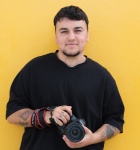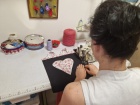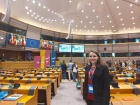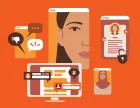Breadcrumb
Stories
Topic
- Ending violence against women and girls (72)
- Gender equality and women’s empowerment (45)
- Anti-violence interventions (29)
- Gender discrimination (29)
- Gender equality and inequality (28)
- Domestic violence/interpersonal violence (27)
- Economic empowerment (22)
- Sexual harassment (22)
- Access to justice and legal protection (21)
- Legal assistance (20)
- Rape/sexual assault (19)
- Gender-responsive budgeting (18)
- Service delivery (18)
- Employment (17)
- Feminicide/femicide (17)
- Primary prevention (17)
- Rural women (17)
- Entrepreneurship (16)
- Laws, legislation (16)
- Youth (16)
- Shelters (15)
- COVID-19 (14)
- Gender power relations (13)
- Civil society (12)
- Gender, culture and society (12)
- Human rights (11)
- Men and boys (masculinity) (11)
- Adolescents (10)
- Businesses and foundations (10)
- Financing for gender equality (10)
- Girls (10)
- Peace and security (10)
- Safe Cities and Safe Public Spaces (10)
- Women’s rights (10)
- Leadership and political participation (9)
- Partnerships (9)
- UNiTE campaign (9)
- Gender mainstreaming (8)
- Information and communications technology (ICT) (8)
- Innovation and technology (8)
- National planning (8)
- Beijing Platform for Action (7)
- Decision-making (7)
- Financial resources (7)
- Generation Equality (7)
- Peacebuilding (7)
- Political empowerment (7)
- Social protection (7)
- Trafficking/sexual exploitation (7)
- 2030 Agenda for Sustainable Development (6)
- Child marriage (6)
- Communications and media (6)
- Gender statistics (6)
- Governance (6)
- Government contributors (6)
- Lesbian, gay, bisexual, transgender, intersex (LGBT) rights (6)
- Markets (6)
- Religion (6)
- Science and technology for development (6)
- Sustainable Development Goals (SDGs) (6)
- Training (6)
- Women farmers (6)
- Women with disabilities (6)
- Access to basic services (5)
- Civil society participation (5)
- Convention on the Elimination of All Forms of Discrimination against Women (CEDAW) (5)
- Governance and national planning (5)
- Political violence (5)
- Productive resources (5)
- Unpaid work (5)
- Accountability (4)
- Gender wage gap (4)
- Health (4)
- Institutional mechanisms (4)
- Public administration (4)
- Sex-disaggregated data (4)
- Voices and profiles (4)
- Women’s movements (4)
- Climate change (3)
- Crisis response and recovery (3)
- Education (3)
- Electoral systems and processes (3)
- Environmental protection (3)
- Gender data production and collection (3)
- Gender stereotypes (3)
- Intergovernmental processes (3)
- In the words of ... (3)
- Land and property (3)
- Media leadership (3)
- National mechanisms (3)
- Poverty (3)
- Sports (3)
- Traditional media (3)
- UN Security Council resolution 1325 (3)
- UN system coordination (3)
- Accountability in the UN system (2)
- Capacity development (2)
- Constitutions and legal reform (2)
- Coordination, knowledge management (2)
- Disaster risk reduction (2)
- Fund for Gender Equality (2)
- Gender data use and accessibility (2)
- Harmful practices (2)
- Health care services (2)
- Humanitarian action (2)
- Inheritance rights (2)
- Monitoring and evaluation (2)
- New media (2)
- Planning and monitoring (2)
- Rural development (2)
- Schooling (2)
- UN Security Council resolutions (2)
- Åsa Regnér, Deputy Executive Director for Policy, Programme, Civil Society and Intergovernmental Support (1)
- Children’s rights (1)
- Citizen engagement (1)
- Commission on the Status of Women (1)
- Executive Director (1)
- Financial and economic crisis (1)
- Food security (1)
- Gender data gaps (1)
- Gender equality indicators (1)
- Green economy (1)
- Literacy (1)
- Living conditions (1)
- Local development (1)
- Macroeconomic policies (1)
- Migration (1)
- Monitoring, evaluation and reporting (1)
- National statistical systems (1)
- Parliamentary development (1)
- Peace processes (1)
- Public sector reform (1)
- Rule of law (1)
- Sexual and reproductive health and rights (1)
- Sexuality (1)
- Temporary special measures, affirmative action (1)
- UN Trust Fund to End Violence against Women (1)
1 - 20 of 181 Results
Pagination
Date:
David Cuka, a 31-year-old trailblazer from Tirana, Albania, joined the UN Women's "Imagine" campaign aiming to raise awareness and challenge cultural stereotypes and gender-based discrimination in Albania and the Western Balkans.
Date:
Young peacebuilders from the Western Balkans participated in a two-day training to strengthen their capacities on the Women, Peace and Security (WPS) and Youth, Peace and Security (YPS) agendas.
Date:
A woman going to work is not a common sight in Prrenjas, a small town in Eastern Albania, about 100 km from the country’s capital. In this area, particularly among people living in villages, women often work the land or take care of their families, constrained by a lack of employment opportunities, limited public transport, and prevailing societal attitudes. Alketa Haxholli, however, has challenged this mindset.
Date:
The week leading to International Women’s Day buzzed with various activities, ranging from a youth-led campaign addressing gender discrimination in the workplace to the launch of Albania's Femicide Watch. An interesting panel featuring only men offered intimate insights into their experiences with patriarchy, feminism, and women’s rights. These events, held in collaboration with governmental bodies, UN agencies, private sectors, and academia, underscored a collective effort to tackle gender inequality from various angles.
Date:
Over the past decades, women and girls around the world have demolished barriers, dismantled stereotypes and driven progress towards more just and equal societies. Women’s rights were recognised as fundamental and universal human rights.
Date:
On International Women’s Day, the People’s Advocate in cooperation with UN Women launched the ‘Femicide Watch’. This first of its kind initiative will collect and analyze data at the national level to promote more effective policies and mechanisms to prevent gender-based killings of women.
Date:
On the occasion of International Women’s Day, UN Women and students of the Faculty of Social Sciences in Albania launched a campaign to tackle gender stereotypes and discrimination, in partnership with Sophie Caffe, a popular coffee shop chain in the country. The initiative won first prize in a student “bootcamp” organized by UN Women as part of the joint UN programme "Leave No One Behind”.
Date:
How a women’s rights organization and the National Employment and Skills Agency in Albania are joining forces to support women survivors of violence integrate in the job market.
Date:
Ema Meçaj is a 19-year-old activist from Albania, currently pursuing a degree in medicine at the University of Medicine in Tirana. A dedicated advocate for human rights, gender equality, and climate action, she recently co-moderated the regional youth consultation from December 13 to 14, 2023, in preparation for the 68th session of the Commission on the Status of Women (CSW68). In this Interview, Ema Meçaj reflects on the youth consultations, outlines the key issues for this year’s CSW, and emphasizes the vital role of youth in advancing the gender equality agenda.
Date:
Forty one percent of Albanian women active online have experienced some form of technology-facilitated violence in their lifetime – the new research “The Dark Side of Digitalization: Technology-Facilitated Violence Against Women in Eastern Europe and Central Asia” shows.
Date:
They are asking for increased long-term, sustainable investments from government, private sector, foundations, and other donors to prevent violence against women and girls.
Date:
On October 27, 2023, more than 40 women-led businesses from Albania participated in the “Women’s Entrepreneurship EXPO” satellite event in Tirana, alongside partners from the private sector, government, and various stakeholders.
Date:
Silvana Subashi is a 47-year-old woman entrepreneur from Albania who is the administrator of Subashi Olive Oil, a cultivation and production oil company that has won many gold medals. A finance graduate with two children, Silvana will participate in the upcoming Women’s Entrepreneurship EXPO 2023 satellite event, taking place on October 27 in Tirana, Albania.
Date:
The UN Resident Coordinator’s Office and UN Women Albania co-organized an online training on the Gender Equality Marker (GEM) and the Human Rights Marker (HRM). The overall aim of the training was to ensure that the GEM and HR Marker scoring will be accurate for the upcoming Joint Work Planning cycle, which will cover the 2024-2025 period. The training was also an important step for ensuring the accuracy of markers is instrumental for adequately score UNCT SWAP Indicator 6.1, which verifies whether adequate resources for gender mainstreaming are allocated and tracked.
Date:
In a dedicated effort to promote gender equality and eliminate all forms of discrimination against women, Albania is preparing for its fifth report to the Committee on the Elimination of All Forms of Discrimination Against Women (CEDAW), scheduled for October 18, 2023.
Date:
A two-day workshop on gender participatory budgeting and community outreach practices brought together civil society organizations, local government representatives, activists, and gender-responsive budgeting experts from Albania and North Macedonia.
Date:
Toxic masculinities, rigid gender stereotypes, hate speech and media representation of traditional gender roles increase the risk of violence, particularly against women, which is considered to be the most widespread form of violence throughout the region – according to a new research supported by UN Women.
Date:
Ejona Zaimaj, recalls her challenging journey to becoming a successful entrepreneur in Albania and explores her new possibilities.
Date:
After six years of dedicated work, the UN Women regional programme Ending Violence Against Women and Girls in the Western Balkans and Turkyie “Implementing Norms, Changing Minds” comes to a close. Civil society organizations, government representatives and partners met to take stock of achievements, challenges, and the way forward.
Date:
Fake news, misinformation, and hate speech are causing significant harm to mental health, exacerbating social divisions, and eroding trust in public institutions throughout the Western Balkans. Marginalized groups, particularly women and girls, are frequently targeted by hate speech. Of particular concern is the role of social media, which has become a fertile breeding ground for disinformation.
1 - 20 of 181 Results



















